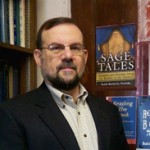By Judith Rosenbaum
This week’s (double) Torah portion, Nitzavim-Vayelech, opens with a scene of great collective drama: the entire community of Israel — men, women and children; leaders and strangers; woodcutters and water drawers — stand together before Moses and God, poised to enter the Promised Land. The 40 years of wandering since their exodus from Egypt has led them to this moment, in which they must reaffirm their covenant with God and take hold of the responsibility to follow in God’s path.
Moses warns the people that straying from the covenant will lead to dire results, but that return is always possible. The choice is theirs — “I have set before you a blessing and a curse” — but the ultimate fulfillment of the covenant is foretold: “Choose life” (Deuteronomy 30:19). Moreover, the blessings described by Moses are accessible — “not in the heavens” (Deuteronomy 30:12), not out of reach.
As I picture the children of Israel gathered before Moses, the image is overlaid with another timely scene of mass gathering and powerful words of admonition, blessing and promise: Wednesday (Aug. 28) marks the 50th anniversary of the March on Washington for Jobs and Freedom, the historic march for civil and economic rights at which Martin Luther King Jr. famously shared his dream for an American future of community and equality.
Though the end of King’s speech has become among the best-known words in American history (even my 6-year-old twins parroted “I have a dream” and shouted “Let freedom ring!” in reporting what they learned about MLK in kindergarten last year), he began with a darker vision of an America that had failed to live up to its promise. In 1963, one 100 years after the Emancipation Proclamation, King described African Americans as exiles in their own land, people who had been handed a “bad check, a check which has come back marked ‘insufficient funds’” regarding equality and the foundational rights of life, liberty and the pursuit of happiness.
On that sticky, sweltering August day 50 years ago, a small team of civil rights and labor leaders and countless organizers brought together a quarter of a million people — men, women and children; leaders and strangers; the 20thcentury equivalents of wood cutters and water drawers; and celebrities, religious leaders and activists — to stand together at the threshold of history. Though many spoke beautifully or lifted their voices in song that day, it was King who turned the March into another covenantal moment.
Standing at the Lincoln Memorial, looking out over the teeming Washington Mall, King set out a vision of America as a promised land, and called upon all who could hear his words to become his partners in fulfilling the American dream. (Five years later, on the eve of his death, he would explicitly — and chillingly — recall the image of Moses on the mountaintop, looking over into the Promised Land, and cry out, “I may not get there with you, but I want you to know tonight that we as a people will get to the Promised Land!”)
Over the past half-century, King’s “I Have a Dream” speech has come to represent the whole of the March on Washington, just as its inspiring final words have overshadowed the more biting critiques of its first half. While it remains eloquent and evocative, it has also taken on the abstract quality of words memorized long ago.
Fifty years later, with King’s dream as yet unfulfilled, the civil-rights movement less immediately insistent and some of its victories (such as the Voting Rights Act, whose passage is credited in part to the March on Washington’s success) on the chopping block, his words feel more aspirational than achievable, more ethereal than accessible. King’s “fierce urgency of now” is today less palpable, less fierce.
The concurrence of this Torah portion and the 50th anniversary of the March serves as a compelling reminder of our ongoing, daily choice to build a society defined by blessing or by curse, and the clear command to “choose life.” These words of Torah call us back to King’s dream and insist that it is “not in the heavens” — or in the annals of history — but rather within our reach, accessible.
The covenant has not expired, and it remains our responsibility to grab hold of the promise of the American dream, as King admonished us to do, and make it real, here on Earth.
Judith Rosenbaum is a writer, educator, historian, and former Director of Public History at the Jewish Women’s Archive, where she worked for more than a decade to create a more inclusive history and to promote history as a tool for social change. A scholar of Jewish studies and women’s studies, the recipient of a Fulbright Fellowship to Israel, and a nationally recognized educator, Judith holds a Ph.D. in American Civilization from Brown University. She is also a founding blogger at Jewesses with Attitude, and a contributing writer on RoleReboot.org. She is currently working on an anthology that explores contemporary redefinitions of the “Jewish mother.” You can find her at judithrosenbaum.com.
ON Scripture — The Torah is a weekly Jewish scriptural commentary, produced in collaboration with Odyssey Networks and Hebrew College. Thought leaders from the United States and beyond offer their insights into the weekly Torah portion and contemporary social, political, and spiritual life.
















